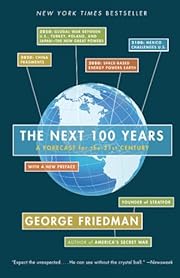

Clica una miniatura per anar a Google Books.
|
S'està carregant… The Next 100 Years: A Forecast for the 21st Century (2009 original; edició 2010)de George Friedman (Autor)
Informació de l'obraThe Next 100 Years: A Forecast for the 21st Century de George Friedman (Author) (2009)
 No hi ha cap discussió a Converses sobre aquesta obra.   ) )I treated this book as a light, speculative and not too serious read of the future of the 21st century geopolitics. In this fashion, it was highly entertaining and even gleamed plenty of insights. I found it via Kindle Unlimited, so it was an easy 'purchase'. One thing I was pleasantly surprised was with certain factors Friedman was already thinking of a decade ago, such as declining fertility rates and its effects upon immigration and the impending population pyramid economic crisis. I guess analysts are supposed to think of them but being part of the general public, I've only noticed these things come to the limelight for the last few years. Anyways, it was cool to see him extend these present occurrences into the logical next step. So a declining fertility rate means a stagnating population growth which means labor gets more valued which means immigration becomes prized. Other things such as soldiers' lives get more valued too, thereby pushing investment into things like robotic or autonomous technology. These notions certainly bring food for thought. Friedman also brings plenty of history to his approach, and utilises it as an outline of a general pattern we can see with certain nations in certain markers of theirs' such as geography or natural resources. One example that is a foundation of this book is the United States' virtually untouchable geography. It was a sizeable advantage in the WW2 and the Cold War and it will continue to be one. Another example is Japan's weakness for natural resources and its essential importing of energy. This played a dominant effect in WW2 and likewise, will continue to do so. This may be the book to finally make me pivot from watching YouTube clips of geopolitical takes (with guilty pleasure), to reading books on geopolitical takes (again, with guilty pleasure). Geopolitics is a fascinating way to view the world and I hope to learn more about it. I would appreciate any recommendations! First thought. This is stupid. Why even try to predict anything how the next the 100 years will play out? But it got me thinking .... the author thinks in terms of historical cultural interactions and demographics. The beginning was fascinating with predictions of Poland, Turkey, and Japan become major world players and how the USA is still on its ascent of being THE major world power. He also offered a plausible reason that China will fail to overtake the USA. I also liked how he explained the strategy of the USA foreign diplomacy. It's more about keeping anyone from dominating their region than making friends. That could explain why the USA ends up fighting against their past allies all the time. The author is smart. He knows a lot of his predictions will fall flat. And though that will happen, it would be helpful for people interested in global politics to follow his thought process. There are not-so-great books that have amazing endings that totally redeem them, and there are pretty good books which have terrible endings that sort of ruin them. The Next 100 Years is the latter type. Don't get me wrong, this book was very well written and George Friedman gives each of the countries their own personalities, which is so cute, but the ending was a cop out. George Friedman decided that the final conflict of the book would actually end in the 22nd century, so he was not obligated to reveal how it plays out. It was just so frustrating to get through the entire book and be met with a cliffhanger. And let's be honest. Most of us will be dead by the time the 22nd century rolls around, so it's not like we can just wait and see. That ruined the book. And it's not like the book is without flaws (besides the fatal one at the end). He starts making up details towards the end (WWIII will start on November 24th, 2050), that he readily admits that he has no way of knowing. That's not necessarily bad, just... weird. And the writing can get a little dry at some points. Besides the end, I really liked the book. Just prepare yourself for disappointment. Sense ressenyes | afegeix-hi una ressenya
Distincions
Utilizing 2000-year-old geopolitical models, expert weather forecaster George Friedman reviews major historical changes and predicts what changes await humanity in the 21st Century. No s'han trobat descripcions de biblioteca. |
Debats actualsCapCobertes populars
 Google Books — S'està carregant… Google Books — S'està carregant…GèneresClassificació Decimal de Dewey (DDC)303.49Social sciences Social Sciences; Sociology and anthropology Social Processes Social change Social forecastsLCC (Clas. Bibl. Congrés EUA)ValoracióMitjana: (3.38) (3.38)
Ets tu?Fes-te Autor del LibraryThing. |
||||||||||||||||||||||||||||||||||||||||||||||||||||||||||||||||||||||||||||||||||||||||||||||||||||||||||||||||||||||||||||||||||||||